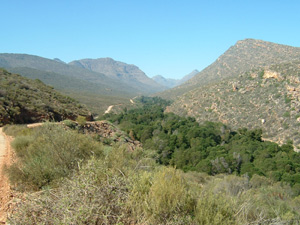Workshop explores the cost of land cover change
27 January 2012 | Story by Newsroom Change: A river course in the Cederberg, Western Cape, heavily infested with Australian Acacias. Alien invasive plants cost South Africa R7 billion per year in lost ecosystem services. (Picture courtesy of Dean Impson)
Change: A river course in the Cederberg, Western Cape, heavily infested with Australian Acacias. Alien invasive plants cost South Africa R7 billion per year in lost ecosystem services. (Picture courtesy of Dean Impson)
UCT held its own at the workshop. Professor William Bond of UCT's Department of Botany described dramatic changes in South Africa's vegetation that are already taking place. "In many areas woody plants are increasing, impacting on grassland ecosystems and wild and domestic grazers," he said.
Projections of future climate change and its effects are very unsure, raising challenges for conservationists and land use planners.
"Climate interacts with a multitude of other factors," said Professor Timm Hoffman of UCT's Plant Conservation Unit. "Social, political and economic factors all affect how people use land, and this will affect vegetation, biodiversity and ecosystem services."
 This work is licensed under a Creative Commons Attribution-NoDerivatives 4.0 International License.
This work is licensed under a Creative Commons Attribution-NoDerivatives 4.0 International License.
Please view the republishing articles page for more information.










